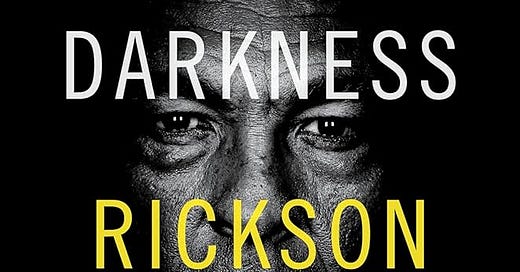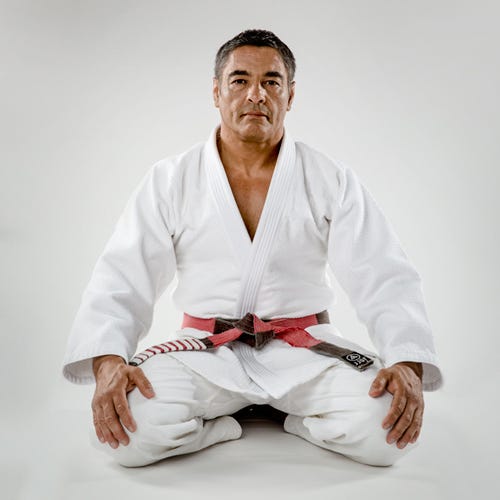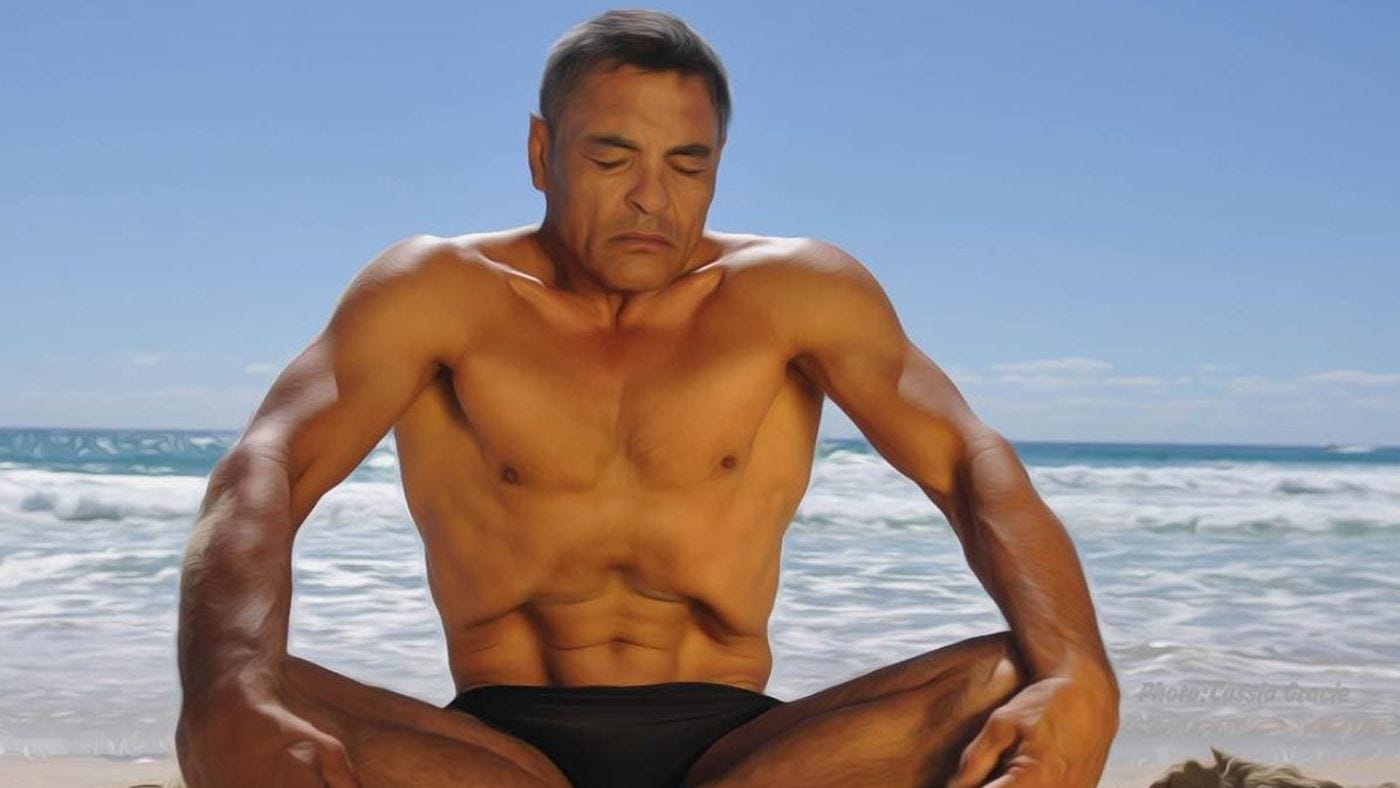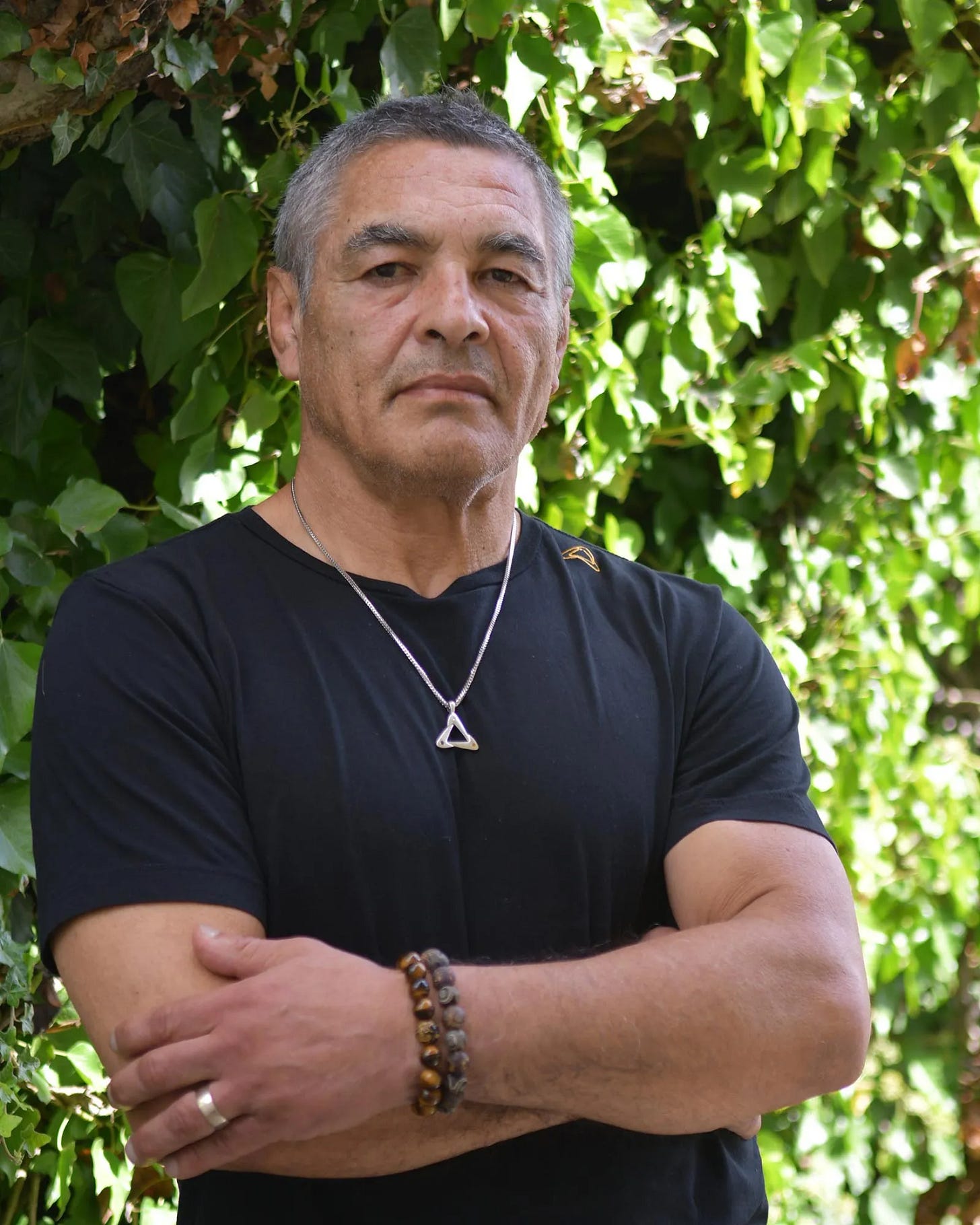Book review
Title: Comfort In Darkness - The invisible power of jiu-jitsu
Written by Rickson Gracie (with Peter Maguire)
162 pages
Released July 18 2024
This book is a follow up to Rickson’s first book, Breathe. That biography covered his early years, history or the Gracie family, and his biggest fights. Originally this book was to be a lifestyle guide but all that changed when Rickson was diagnosed with Parkinson’s disease in 2021.
On his Parkinson’s disease Rickson said this, “In life and jiu-jitsu sometimes you are the hammer and sometimes you are the nail. When you are faced with unexpected challenges, you can either quit and submit without a fight, or you can take a deep breath and engage. While I might not be able to reverse the effects of Parkinson’s disease, I will never cede an inch of ground to it without a fight. Like my father taught me, you can’t defeat a person who never gives up…If this disease is the price for my success, then so be it. I will die a happy man, because I have tasted glory and had the privilege of teaching people from all walks of life how to apply the basic principles of jiu-jitsu to their lives.”
Today the retired champion is no longer interested in MMA or competitive jiu-jitsu. Instead, he uses his art to teach students about themselves. He is focused on teaching people who are not athletes or fighters. Because they are the ones who need it the most.
Rickson focuses on teaching the principles of BJJ. Base, engagement, connection, leverage, weight distribution, and timing.
Rickson Gracie (born in 1959) is the son of the founder of Gracie Jiu-Jitsu, Helio Gracie. His father inspired him greatly. Other people that Rickson admired in his youth were athletes like Muhammad Ali (who Rickson modeled his training programs), Mike Tyson, Pele (soccer), Masahiko Kimura (who defeated Helio), Chiyonofuji “Wolf” Mitsugu (sumo wrestler), Kai Lenny (surfer) and Bruce Lee.
Rickson gets deep into his training routine for fights. He broke it down into three different segments. The first focused on strength, the second on cardio, and the third on BJJ technique. He also got into how important it is for him to get out into nature before each of his fights.
Rickson dominated his no holds barred fights in Japan in the 1990’s and became a BJJ icon. He describes going to BJJ tournaments to coach his son and hundreds of people approaching him for a picture. He said to keep himself grounded after an event like that he would go to a large public space like a shopping mall and walk around to feel like a regular person.
Rickson’s final fight was in 2000 against Masakatsu Funaki. Although he did win the fight by choking his opponent unconscious, Rickson suffered significant damage in the fight. He broke his orbital bone which took away his vision. Rickson describes one of his mentors telling him, “All athletes fail; what separates the greatest from the great is their ability to recover from failure.” He pulled himself together, adjusted his strategy and won by rear-naked choke.
One fight that never happened was Rickson Gracie vs. Kazushi “The Gracie Hunter” Sakuraba. The reason it never happened despite Rickson being offered 5 million dollars was this. Rickson’s son, Rockson Gracie tragically passed away. After his son’s death Rickson decided that he no longer had the same will to fight. It was time to retire from fighting. This part of the book is quite tragic. Rickson really shows a vulnerability that he does not usually show.
Rickson decided to shift his focus to becoming a BJJ teacher. He had always been focused on his own jiu-jitsu. He gives his thoughts on the current state of BJJ. Rickson says BJJ was originally developed so people could defend themselves in the real world. It is more important for him to teach someone how to survive rather than how to win. He thinks today’s version of BJJ is impractical for self-defense. He acknowledges that the current athletes are tough, competitive, and train hard.
Rickson observed many BJJ world champions who struggled to teach a class with people of different physical capabilities. He decided to focus on teaching his fundamental understanding of base, connection, engagement, leverage and timing.
“It is much easier for me to teach someone to be a high-level jiu-jitsu competitor than it is to teach them to be a martial artist.”
Kron Gracie, the son of Rickson is an ADCC champion and a BJJ icon like his dad. While talking about Kron and his transition to mixed martial arts he said, “I respected Kron enough to let him follow his own path in MMA. When he decided to train with the Diaz brothers, I became more of an observer than a coach. While I don’t think that there are any tougher fighters in MMA, I do not share the Diaz brothers’ fighting sensibility because it is built around toughness and a willingness to endure punishment to hand out punishment.”
Rickson follows with his thoughts on modern MMA. He admires Khabib. He doesn’t like how the UFC is about entertainment and “slugging it out”. He advocates for a few rule changes. Rickson thinks there should be tiebreaker rounds. His vision of MMA is a week long vale tudo tournament where elite wrestlers, boxers, BJJ, MMA fighters go against each other in bouts with 15 minute long rounds. As many rounds as necessary to determine a winner. Get rid of gloves. Replace the cage with a raised platform. Strict drug testing. Referees would not be allowed to force a fighter to stand up on the ground.
“Take away the judges, points, gloves, cage, and short rounds, and resilience, breathing, continuity, comfort, discomfort – the things that will save you in a real fight – become important.”
Rickson also makes a plea for people to get off their phones and start connecting with themselves and each other through the art of jiu-jitsu. Instead of taking pills for weight loss he thinks people should focus on the cause that made them unhealthy. Take an active role in your health. Change your diet and lifestyle.
Injuries began to pile up as Rickson got older. His neck, back and hips were worn out. He often went right from teaching a seminar to physical therapy. He had a full hip replacement. Now he must teach his BJJ concepts with very little stress on his body.
He finishes the book by getting more into his Parkinson’s diagnosis. He says he felt his body breaking down and his motor skills and reflex slowing down. He was forced to stop surfing and stop hard jiu-jitsu training. He learned as much as he could about Parkinson’s to educate himself and fight the disease with all possible resources. He does not believe the Parkinson’s is a result of fighting.
Rickson tells a story about speaking with another person his age who had Parkinson’s for over 20 years. It reminded me of Marcelo Garcia’s post match speech after he beat Imanari. Marcelo said, “When you have a problem you need to tell people about it. Tell people about your problem so they can help you.”
His life is not over. But it is different now.
“Now I am not just a jiu-jitsu professor. I am a sick person battling an incurable disease and must walk my talk of acceptance and finding comfort in darkness. This does not rob me of being happy. We are all going to die one day, but being unhappy, uninspired, and having no love in my heart is a fate worse than death.”
Conclusion
I am a huge fan of Rickson Gracie and the history of jiu-jitsu. I feel really honored to live in the same era as one of the greatest BJJ legends of all time. There will never be another BJJ legend like Rickson Gracie that can claim being 400-0 and people believe it. I believe it. Among the family the created BJJ he is the undisputed family champion. It’s inspiring to read Rickson’s words.
Personally, both of my grandfathers passed away from Parkinson’s disease. It was tough to watch. They were both fighters. They both kept a mentality close to Rickson Gracie. Parkinson’s was a fight and they would not quit. I cried a few times thinking about them while I read this. I miss them very much.
This book has inspired me to take a little bit more from Rickson’s philosophy and I hope others can do the same.
“Learning to breathe, physically engage, detach and disengage also forces people to be present and interact with other humans. If students do this work honestly they don’t just get better at jiu-jitsu; they can rebuild themselves as stronger people.”
Rickson Gracie’s Family
Father – Helio Gracie
Brothers – Rolls Gracie, Relson Gracie, Rorion Gracie, Royler Gracie, Royce Gracie
Cousins – Carlson Gracie, Robson Gracie, Rilion Gracie, Renzo Gracie, Ralph Gracie, Jean Jacques Machado, Rigan Machado
Sons – Kron Gracie, Rockson Gracie
Nephews – Roger Gracie, Neiman Gracie, Kayron Gracie
Niece – Kyra Gracie
Please follow the writer Josh Presley on Instagram, YouTube, TikTok & Facebook @PresleyBJJ for daily BJJ content, and tune into The Great Canadian BJJ Show Podcast on Spotify or the podcast app. PresleyBJJ.com







